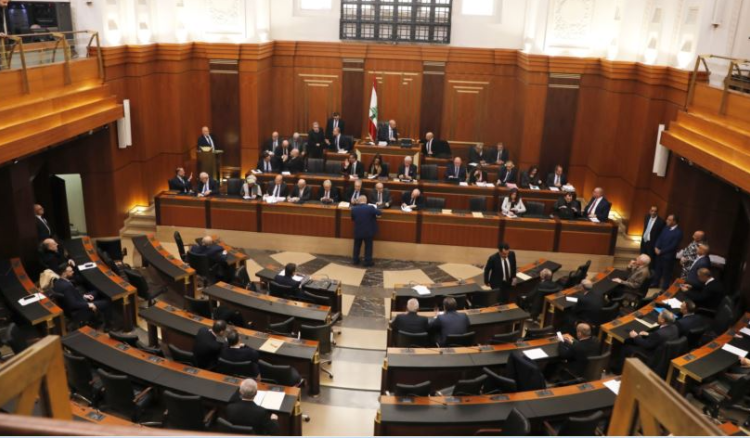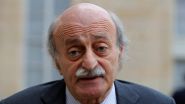
Uncertainty continues to surround the plenary session scheduled for tomorrow, Tuesday. The session is set to resume the review of bills and draft laws that were on the agenda for the September 29 meeting. That session was postponed after MPs from several parliamentary blocs, including the Lebanese Forces (LF), Kataeb, the Progressive Socialist Party (PSP), and some “independent” or “change” MPs, withdrew in protest over the absence of electoral reform.
A similar scenario could unfold tomorrow, as the issue of amending Article 112 of the electoral law, which concerns voting rights for Lebanese abroad, is not on the agenda.
Opposition MPs, including the LF, Kataeb, and some “independent” and “change” MPs, have announced that they will boycott the session. After a meeting on Sunday evening, the LF called on the prime minister and the government to take responsibility by approving a draft law to repeal Article 112 and submit it to Parliament as an urgent decree before the legal deadline. The purpose of this step is to prepare for the May 2026 legislative elections.
The leader of the LF, Samir Geagea, called on Monday for all MPs to boycott tomorrow’s plenary session in protest against the way Nabih Berri is running Parliament. He urged Berri to place on the agenda the double-urgency draft law repealing Article 112 so that the session could be used to address the issue, examine the proposal, and proceed with other votes.
Amal and Hezbollah, as well as the Free Patriotic Movement (FPM), will take part in the session. The Democratic Gathering (PSP) and National Moderation blocs will also attend, but their stance remains cautious.
MP Hadi Abou el-Hosn (PSP) told This is Beirut that while his bloc remains committed to amending Article 112, they will not halt legislation or paralyze constitutional institutions. He said the position is a matter of principle. “We remain consistent and true to our original stance, supporting the right of expatriates to vote for all 128 MPs, but we will not boycott the session.”
Similarly, MP Ahmad Rustom (National Moderation) confirmed that he will attend the session, citing “the importance of Parliament’s legislative role.” He added that “the bloc has never boycotted a session.” He said his position on the electoral law will be announced at a later date.
The outcome of the session will hinge on a few key MPs, often seen as “swing votes.” The coming hours will be critical as the countdown to the 2026 elections picks up and legal deadlines approach.
The September 29 session was marked by a particularly tense atmosphere. The meeting was cut short due to a lack of quorum, and only nine of the seventeen agenda items were approved. These included decrees on agricultural development, the printing of new banknotes by the Central Bank (BDL), pension funding, and amendments to the public-private partnership law. A loan for reconstruction was discussed but not approved.
Tomorrow’s agenda includes several key items: the law on solid waste, the integration of contractual employees at the Ministry of Information into the pension system, the reinstatement of former customs officers, consumer protection measures, the regularization of deserters from the internal security forces, and tax exemptions for victims of the war between Hezbollah and Israel.
Contested Law and Grey Areas
The standoff continues between Berri and the MPs boycotting the legislative sessions, as the question of expatriates voting for all 128 MPs remains unresolved. Sixty-seven MPs opposing the Amal-Hezbollah duo and the FPM are calling for Lebanese abroad to be allowed to vote in their home constituencies.
Under Lebanon’s Electoral Law No. 44 of 2017, Lebanese living abroad are allocated six reserved seats in Parliament – three for Christians and three for Muslims – spread across all continents, as set out in Article 112. These seats were meant to form a separate “diaspora constituency,” temporarily increasing the total number of MPs from 128 to 134, before six seats would be removed from local constituencies in the next election.
However, this provision was never implemented in the 2018 and 2022 elections. Like residents, expatriates voted in their home constituencies for the 128 parliamentary seats. Today, a heated debate pits supporters of keeping the six reserved seats against those calling for their repeal so that Lebanese abroad can vote for all 128 national seats.
On October 13, the Ministry of Foreign Affairs submitted a draft law to the government proposing the repeal of Articles 112 and 122, which would allow Lebanese abroad to vote for all 128 MPs in their registered constituencies. Some political groups, particularly the Amal-Hezbollah duo, fear that broader diaspora voting could upset the internal electoral balance in their favor.
As a result, Lebanese living abroad still do not know under which law their vote will take place, even as the first registration deadline approaches on November 20.




Comments